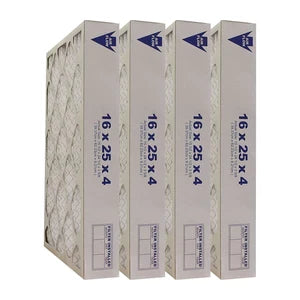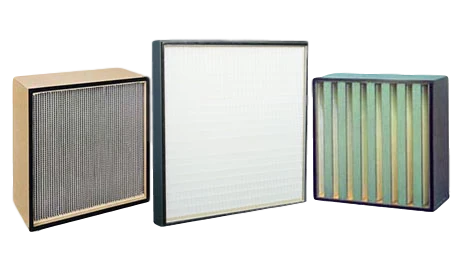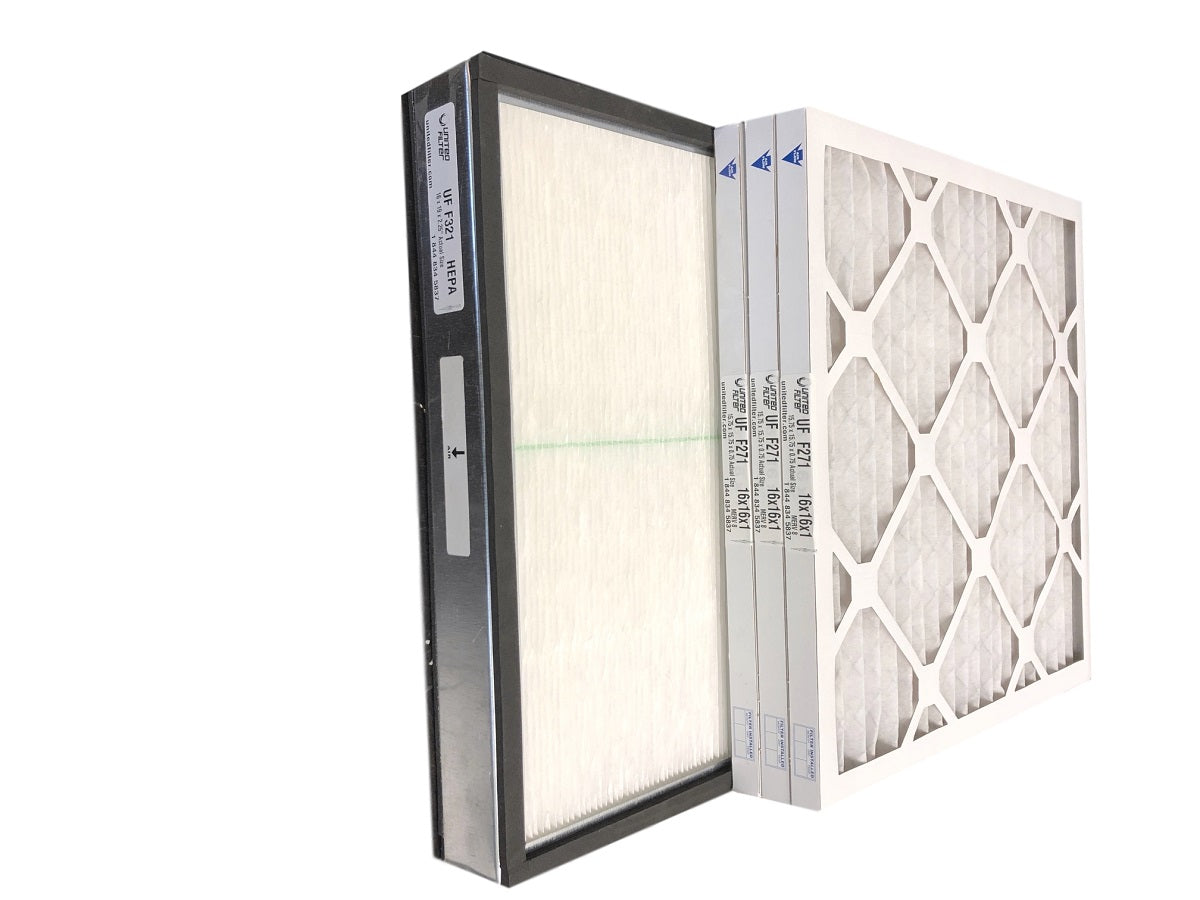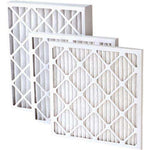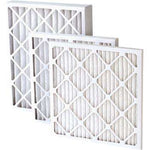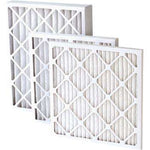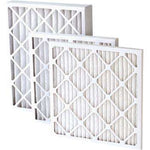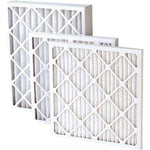You have no items in your shopping cart.
HEPA air filters are a specific type of high-quality air filter. The HEPA air filter standard is set to ensure that air filters remove at least 99.97% of particles (from large to smaller particles of about 0.3 microns) from the air. The HEPA air filter is a common component of many air purification systems installed in homes and offices with the aim of improved indoor air quality.
It is important to note that there are other types of air filters including carbon filters, standard fiberglass, and pleated furnace filters. HEPA filters are used where high air quality is needed or desired.
Settings include: pharmaceuticals, aerospace, nuclear power, technology industries and residential homes.
HEPA stands for High Efficiency Particulate Air. HEPA filters are made up of thousands of extremely fine fibers which are arranged specifically to intercept debris of all sizes including very small microscopic particles.
A high quality HEPA air filter is capable of trapping as much as 100 percent of particles in the air and is designed to be used to reduce the number of pollutants in the room.
What are the benefits of a HEPA filter?
Investing in a HEPA air filter benefits your health by providing a cleaner indoor air environment. Aside from being a tested and trusted technology in improving indoor air quality, HEPA air filters are built for reliability.
Why is it necessary to remove such small particles from the air?
Taking into consideration that indoor air space contain a lot of harmful microorganisms and particles which may be unseen but causing harm to your health and polluting the indoor environment, it is important to invest in an air purifier with a proven technology. HEPA air filters can save homeowners
and businesses from the potential harm and health risks such as lung irritation, allergies and asthma.
Popular reasons for choosing a HEPA filter
Everyone wants a clean bill of health. Using a HEPA air filter to ensure quality indoor air is important.
However, in some cases, there is more of need for the use of HEPA filtration and these cases can include:
New parents:
HEPA air filters are great for new parents as they help protect the newborn from immune, and respiratory issues.
Smokers:
HEPA filters are used in environments where people smoke tobacco products. They are effective in removing smoke particles, contaminants and other associated odours.
Pet Owners:
Pet owners can also benefit from the use of HEPA filters as they help remove allergy-causing dander and hair from the air.
Asthma Protection:
HEPA filters are also used by individuals who suffer from asthma keeping the indoor air clean.

Featured: Compatible Dri-Eaz HEPA 500 F321 Defendair Kit.
For a wide range of custom and non-custom HEPA Air filters, visit United Filter at: https://unitedfilter.com/
HEPA Filters Frequently Asked Questions
Are HEPA Air Filters Worth It?
HEPA (High-Efficiency Particulate Air) filters are renowned for their efficiency in trapping airborne particles. A true HEPA filter can capture at least 99.97% of particulates 0.3 microns in size. For Canadians suffering from allergies, asthma, or other respiratory conditions, investing in a HEPA filter can significantly improve indoor air quality. The benefit is particularly noticeable during long winters when homes are sealed against the cold, trapping pollutants inside.
What Do HEPA Filters Not Remove?
While HEPA filters excel at capturing particles like pollen, dust mites, and pet dander, they are not as effective against gases and odors. VOCs (Volatile Organic Compounds) such as formaldehyde, which can off-gas from furniture, carpets, and building materials, are too small for HEPA filters to catch. They also do not remove carbon dioxide, carbon monoxide, or other gases, which means they might need to be used in conjunction with other types of filters to achieve comprehensive air purification.
Can I Clean a HEPA Filter?
Cleaning a HEPA filter is not recommended as washing or vacuuming can damage the delicate fibers that trap particles. Some HEPA filters are marketed as "washable" or "permanent," but these generally need to be cleaned very carefully according to manufacturer instructions to avoid reducing their effectiveness. For most HEPA filters, regular replacement is advised to maintain optimal air quality.
Who Needs a HEPA Filter?
HEPA filters are particularly beneficial for:
- Individuals with asthma, allergies, or respiratory issues who need a cleaner indoor environment.
- Families with young children or elderly members who are more susceptible to air quality issues.
- Canadians living in areas with high pollution levels or where wildfire smoke is a seasonal problem.
- Pet owners who struggle with pet hair and dander.
What Are the Disadvantages of HEPA Filters?
HEPA filters come with several drawbacks:
- Cost: They are typically more expensive than other types of air filters.
- Maintenance: They require regular replacement to maintain efficiency.
- Airflow Restriction: HEPA filters can restrict airflow in HVAC systems which may require systems to work harder, potentially increasing energy costs.
- Size and Weight: They are often bulkier and heavier than other filters, which can be an issue in smaller spaces.
Why Are HEPA Filters Rarely Used in Homes?
Despite their effectiveness, HEPA filters are not commonly found in residential settings due to several factors:
- Compatibility: Many home HVAC systems are not equipped to handle the dense structure of HEPA filters without modifications.
- Cost: They are more expensive both to purchase and to operate, as they can require more frequent replacement and can increase energy bills due to their impact on airflow.
- Overkill: For many households without special air quality needs, HEPA filtration might be more than is necessary, making less intensive filters a more cost-effective option.
HEPA air filters are a specific type of high-quality air filter. The HEPA air filter standard is set to ensure that air filters remove at least 99.97% of particles (from large to smaller particles of about 0.3 microns) from the air. The HEPA air filter is a common component of many air purification systems installed in homes and offices with the aim of improved indoor air quality.
It is important to note that there are other types of air filters including carbon filters, standard fiberglass, and pleated furnace filters. HEPA filters are used where high air quality is needed or desired.
Settings include: pharmaceuticals, aerospace, nuclear power, technology industries and residential homes.
HEPA stands for High Efficiency Particulate Air. HEPA filters are made up of thousands of extremely fine fibers which are arranged specifically to intercept debris of all sizes including very small microscopic particles.
A high quality HEPA air filter is capable of trapping as much as 100 percent of particles in the air and is designed to be used to reduce the number of pollutants in the room.
What are the benefits of a HEPA filter?
Investing in a HEPA air filter benefits your health by providing a cleaner indoor air environment. Aside from being a tested and trusted technology in improving indoor air quality, HEPA air filters are built for reliability.
Why is it necessary to remove such small particles from the air?
Taking into consideration that indoor air space contain a lot of harmful microorganisms and particles which may be unseen but causing harm to your health and polluting the indoor environment, it is important to invest in an air purifier with a proven technology. HEPA air filters can save homeowners
and businesses from the potential harm and health risks such as lung irritation, allergies and asthma.
Popular reasons for choosing a HEPA filter
Everyone wants a clean bill of health. Using a HEPA air filter to ensure quality indoor air is important.
However, in some cases, there is more of need for the use of HEPA filtration and these cases can include:
New parents:
HEPA air filters are great for new parents as they help protect the newborn from immune, and respiratory issues.
Smokers:
HEPA filters are used in environments where people smoke tobacco products. They are effective in removing smoke particles, contaminants and other associated odours.
Pet Owners:
Pet owners can also benefit from the use of HEPA filters as they help remove allergy-causing dander and hair from the air.
Asthma Protection:
HEPA filters are also used by individuals who suffer from asthma keeping the indoor air clean.

Featured: Compatible Dri-Eaz HEPA 500 F321 Defendair Kit.
For a wide range of custom and non-custom HEPA Air filters, visit United Filter at: https://unitedfilter.com/
HEPA Filters Frequently Asked Questions
Are HEPA Air Filters Worth It?
HEPA (High-Efficiency Particulate Air) filters are renowned for their efficiency in trapping airborne particles. A true HEPA filter can capture at least 99.97% of particulates 0.3 microns in size. For Canadians suffering from allergies, asthma, or other respiratory conditions, investing in a HEPA filter can significantly improve indoor air quality. The benefit is particularly noticeable during long winters when homes are sealed against the cold, trapping pollutants inside.
What Do HEPA Filters Not Remove?
While HEPA filters excel at capturing particles like pollen, dust mites, and pet dander, they are not as effective against gases and odors. VOCs (Volatile Organic Compounds) such as formaldehyde, which can off-gas from furniture, carpets, and building materials, are too small for HEPA filters to catch. They also do not remove carbon dioxide, carbon monoxide, or other gases, which means they might need to be used in conjunction with other types of filters to achieve comprehensive air purification.
Can I Clean a HEPA Filter?
Cleaning a HEPA filter is not recommended as washing or vacuuming can damage the delicate fibers that trap particles. Some HEPA filters are marketed as "washable" or "permanent," but these generally need to be cleaned very carefully according to manufacturer instructions to avoid reducing their effectiveness. For most HEPA filters, regular replacement is advised to maintain optimal air quality.
Who Needs a HEPA Filter?
HEPA filters are particularly beneficial for:
- Individuals with asthma, allergies, or respiratory issues who need a cleaner indoor environment.
- Families with young children or elderly members who are more susceptible to air quality issues.
- Canadians living in areas with high pollution levels or where wildfire smoke is a seasonal problem.
- Pet owners who struggle with pet hair and dander.
What Are the Disadvantages of HEPA Filters?
HEPA filters come with several drawbacks:
- Cost: They are typically more expensive than other types of air filters.
- Maintenance: They require regular replacement to maintain efficiency.
- Airflow Restriction: HEPA filters can restrict airflow in HVAC systems which may require systems to work harder, potentially increasing energy costs.
- Size and Weight: They are often bulkier and heavier than other filters, which can be an issue in smaller spaces.
Why Are HEPA Filters Rarely Used in Homes?
Despite their effectiveness, HEPA filters are not commonly found in residential settings due to several factors:
- Compatibility: Many home HVAC systems are not equipped to handle the dense structure of HEPA filters without modifications.
- Cost: They are more expensive both to purchase and to operate, as they can require more frequent replacement and can increase energy bills due to their impact on airflow.
- Overkill: For many households without special air quality needs, HEPA filtration might be more than is necessary, making less intensive filters a more cost-effective option.
